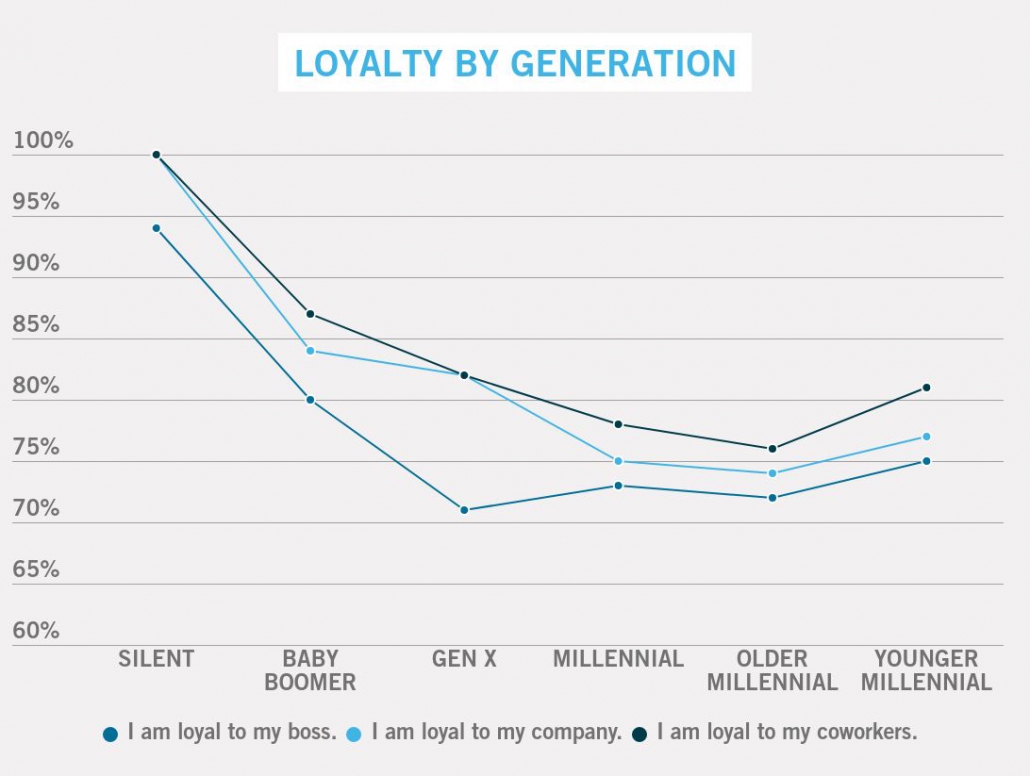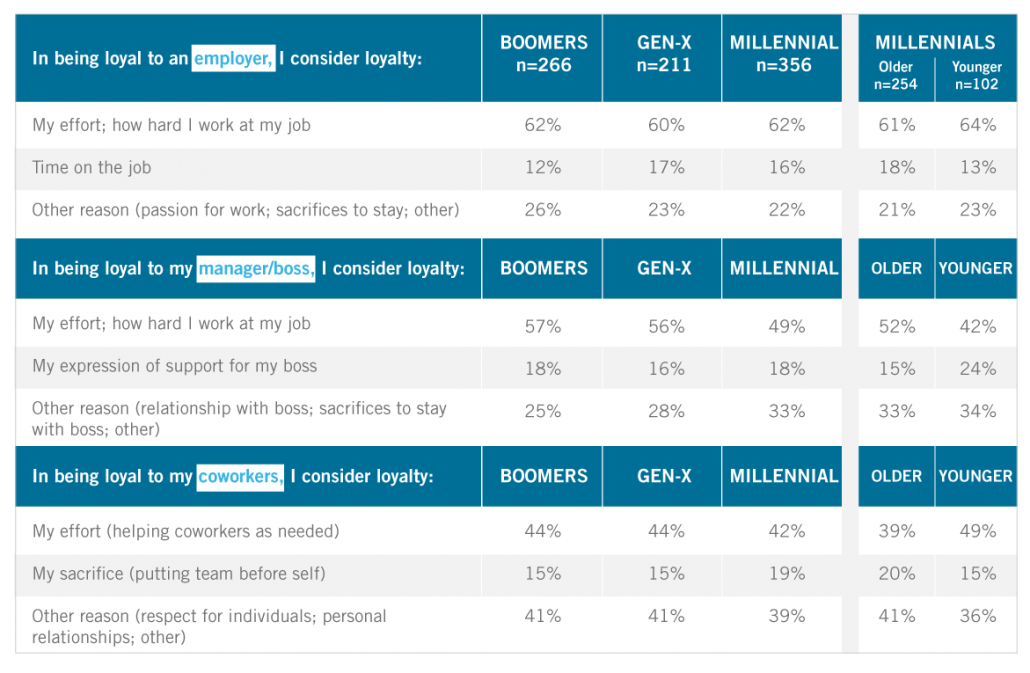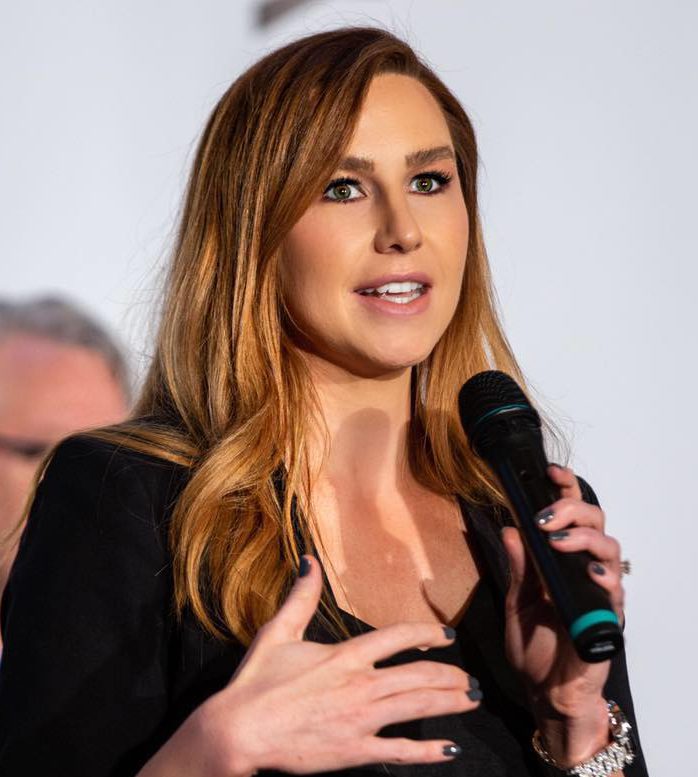
Are Millennials Loyal?
NOVEMBER 2019
by Heather Sutphin, Burke, Inc.; Jaci Jarrett Masztal, Burke, Inc.; and Gabrielle Bosché, Millennialsolution.com
Millennials, as the stereotype goes, are in it for themselves. This is the generation supposedly not as hardworking as the others – they do less, demand more, and the term “loyalty” has little meaning to them. Yet research shows that in many ways, Millennials hold traditional views with regards to their jobs. Like other generations, they strive for a meaningful and fulfilling career, solid compensation, competitive benefits, positive relationships with coworkers, and opportunities to develop and grow.1 However, Millennials tend to care more about flexibility10, time off8, feedback and acknowledgement12, and corporate responsibility9 than their Gen X or Baby Boomers counterparts.
So, what about loyalty? Are Millennials actually loyal? Perhaps that’s not a fair question. It’s hard to define loyalty without context, and given today’s thriving economy and 3.5% unemployment rate, what does it really mean now, anyway?
Many years ago, if employees worked hard and demonstrated loyalty to the company, the company would reward steady careers and comfortable retirement.5 My father worked for AT&T for 38 years and my aunt for 42 years, and neither would have even considered – let alone thought about – working for another company.
In 2019, this is neither my father’s nor my aunt’s loyalty.
Work loyalty was essentially “killed off through shortening contracts, outsourcing, automation, and multiple careers.”6 Clearly, the evolution of loyalty is two-sided. Millennials (and others) didn’t decide one day to throw allegiance out the window – organizations did their part to change this landscape as well.
Being raised in a “layoff” culture has led many Millennials to view loyalty in terms of months, not years.2 One study found that 25% of Millennials believe staying at a job for seven months indicates they are loyal; for Boomers, that increases to five years.11
So, where do things stand now? 2019 Burke data confirms a downward trend in commitment and loyalty, continuing to decrease with each new generation. We are, however, seeing a shift with younger Millennials and even Gen Z. It’s early, but perspectives do continue to change.
When we look at job loyalty, there are declines by generation, as noted in the graph below. However, this cross-sectional look also reflects where people are in their career stage. With most of the Silent Generation retired and many Baby Boomers exiting or planning to soon, it’s not surprising that over 80% of these generational groups indicate a loyalty to their coworkers, company, and boss. Most surprising is how strong loyalty is for Gen X and Millennials, at 70% or higher. But these numbers are meaningless unless we first define loyalty.


In Burke’s most recent Workforce Perspectives® study, respondents were asked what constitutes “loyalty” and, to be expected, differences were found across generations.
When asked “What defines loyalty to an employer, to a job and to coworkers?” the level of effort was the top response for all three categories. In the past, loyalty was defined as time on the job, but in today’s world, people believe they can be very loyal to their company, position, and coworkers without necessarily meaning they will stay until retirement.
We did find subtle differences between Older (born between 1981-1988) and Younger Millennials (born between 1989-1996). Younger Millennials put more focus on providing direct support to their manager/boss and their coworkers than Older Millennials. Almost a quarter (24%) of Younger Millennials consider loyalty to their boss as “how often they express their support,” as compared to 15% of Older Millennials. Nearly half (49%) of Younger Millennials also consider “helping out their coworkers” as an example of loyalty, while only 39% of Older Millennials agree.

So when we speak of Millennials looking at loyalty differently, we must also add that a shift in thinking is present in Baby Boomers and Gen Xers as well. Changes in loyalty may best reflect where the workforce is in relation to their work and who they work for and with, rather than a self-focused, defiant attitude among Millennials to “not” be loyal.

As an organizational psychologist and Vice President at Burke, Inc., Jaci Jarrett Masztal energetically helps companies connect the dots between internal company culture, organizational effectiveness and employee engagement to the external customer engagement, loyalty and business performance.

Heather Sutphin is a Senior Analyst at Burke, Inc., with a PhD in Industrial/Organizational Psychology. With experience across industries and methodologies, Heather partners with clients through all phases of research to create actionable insights.

Gabrielle Bosché is a Millennial strategist and one of the most booked Millennial motivation experts in the world. She is the founder and President of The Millennial Solution, an international training and consulting company bridging the generation gap. Gabrielle gives audience an honest and scientific review of her generation and provides real – no theory allowed – solutions.
Interested in reading more? Check out other articles by the authors:
Work Life in COVID-19: Employees Adapt to a New Normal
Overcoming Silos through Customer Centricity
Is it Time for a Cultural Reality Check?
As always, you can follow Burke, Inc. on our LinkedIn, Twitter, Facebook and Instagram pages.
References:
- Andrews, W., & Cain, M. Gartner. Com (2018). https://www.gartner.com/en/documents/3862563/millennial-digital-workers-really-do-differ-from-their-elders. February 27.
- Autry, A. (2019). Millennial Employee Engagement & Loyalty Statistics: The Ultimate Collection. https://blog.accessperks.com/millennial-employee-engagement-loyalty-statistics-the-ultimate-collection, Jan 7, 2019.
- Burke, Inc. (2019). Workforce Perspectives, proprietary research, April.
- Emmons, M. Key Statistics about Millennials in the Workplace, downloaded 10/7/19, https://dynamicsignal.com/2018/10/09/key-statistics-Millennials-in-the-workplace/
- Erickson, T. (2012). Trust is dead; long live trust. Harvard Business Review, March 1.
- Gratton, L. (2011). Blog post. https://lyndagrattonfutureofwork.typepad.com/?utm_source=Fowville+Newsletter&utm_campaign=4341d721be-Gazette_n_1816_03_2011&utm_medium=email
- Korkki, P. (2011). The shifting definition of worker loyalty. New York Times, April 23.
- Manpower (2016). Millennial Careers: 2020 Vision. https://manpowergroup.us/campaigns/manpower/millennial-careers/
- McGlone, T., Spain, J.W., & McGlone, V. (2011) Corporate Social Responsibility and the Millennials, Published online: 21 Apr 2011. https://doi.org/10.1080/08832323.2010.502912, pp. 195-200.
- Taylor, T. (2018). Workplace Flexibility for Millennials: Appealing to a Valuable New Generation. https://www.adp.com/spark/articles/2018/10/workplace-flexibility-for-Millennials-appealing-to-a-valuable-new-generation.aspx
- Ultimate Software (2015). Is there really a millennial divide at work? Ultimate Software and the Center for Generational Kinetics. https://www.ultimatesoftware.com/Contact/hr-whitepaper-is-there-really-a-generational-divide-at-work
- White, P. (2018). Do Millennials want to be shown appreciation differently? Appreciation at work, September 16, 2018. https://www.govloop.com/community/blog/Millennials-want-shown-appreciation-differently/
- Feature Image – ©Alex from the Rock – stock.adobe.com








